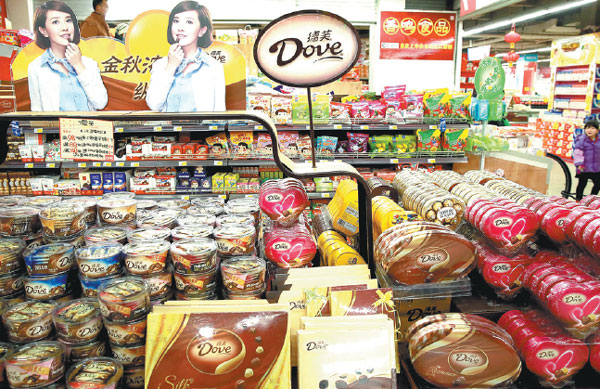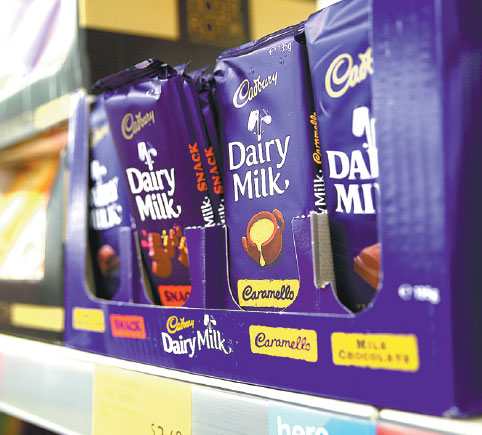Chocolate companies see sales melt away
Updated: 2015-09-02 08:38
By Shi Jing In Shanghai(China Daily USA)
|
||||||||
China's slowing economy, the government's anti-corruption drive and a change in consumer habits have been blamed for poor results Global confectionary companies were once surrounded by the sweet smell of success. But times are changing as major brands report crumbling sales and tumbling profits.
For the second quarter of this year, Mondelez International Inc, which owns Cadbury chocolate products and Oreo cookies, announced a 9.2 percent drop in profit to $7.7 billion compared to the same period in 2014. Demand in the Asia-Pacific region, which includes China, fell by 5.5 percent to $1.02 billion.
In a move to cut costs, the multinational confectionery, food and beverage conglomerate, based in the United States, has started trimming staff in Nanjing and Shanghai as well as moving its Beijing office to one of its factories in the capital.
It is also planning to close a Shanghai plant, which employs 400 workers, which will leave Mondelez with six factories in China and a work force of around 5,500 people.
"Consumption of chocolates has declined significantly in the past 12 months," Jason Yu, general manager of consumer market research company Kantar Worldpanel China, said.
"High-end chocolates with glossy packaging, which were excellent gifts, have seen a significant drop in sales due to the Chinese government's anti-corruption crackdown. Also, ordinary consumers now have more choices when it comes to snacks."
Mondelez is not the only major player suffering. Mars Inc, the world's largest confectionery maker with brands such as Dove, M&M and Snickers, has felt the chill of slowing sales.
Data from Euromonitor International Ltd, the privately owned market intelligence firm based in the United Kingdom, showed that Mars' market share dropped for the first time in China last year to 39.4 percent from 39.6 percent in 2013. Euromonitor has predicted it will shrink to 38.8 percent this year.
Hershey Co, an iconic brand in the US, saw its chocolate sales in China fall to $35 million in the second quarter of this year. As a result, Hershey globally reported a net loss of $99.9 million, while it made a net income of $168.2 million a year ago. "We have been disappointed with our performance in China so far," Steven Schiller, president of Hershey China and Asia, said.
A slowing economy, the government's anti-corruption drive and a change in consumer habits have been blamed for melting chocolate sales.
Still, China is expected to consume 220,700 metric tons of chocolate this year, or an increase of 6.3 percent on 2014, according to Euromonitor. That is on a par with recent annual growth rates, but there are concerns those figures are unsustainable in the future. Just like Mars, Mondelez and Hershey, Nestle SA also faces a "difficult" economic climate.
"Past growth was built partly on expanding sales to new consumers in second-and third-tier cities in China, but now those places are saturated and chocolate makers must convince Chinese consumers simply to eat more," Xu Ruyi, head of research at Mintel China, a leading research firm, told Reuters news agency.
Sales in hypermarkets and supermarkets in the first-tier cities, such as Beijing and Shanghai, have declined in the past few months, which is one of the reasons for Hershey's stagnant performance in the market.
"As the country moves to the new normal, which is more consumer-led, we are seeing a good shift, but it will not come easily," Schiller said. "The falling stock market has dented consumer sentiment and China's middle classes are saving more and spending less."
Disappointing sales during the Chinese New Year holiday left Hershey playing catch-up for the rest of 2015. Promotions and marketing have helped stimulate growth, but that is not a long-term fix. Another concern has been Shanghai Golden Monkey.
Hershey bought an 80 percent stake in SGM last year, but sales have not held up.
"The company's performance was poorer than anticipated," Schiller said, adding that Hershey will complete the full acquisition of SGM by the end of the year. "But Golden Monkey will be an important part of our overall strategy in China."
It will also help Hershey diversify in the country. SGM's bulging portfolio, which includes popular products such as candies and dried bean-curd, will enable the parent company to expand into lower-tier Chinese cities.
"People in lower-tier cities have more disposable income," Schiller said. "The middle class group has been growing and this will help our retailing business in China."
His view is backed up by the numbers. While the Consumer Confidence Index, or CCI, for first-tier cities dipped by 1 percent in the second quarter, it jumped by 10 percentage points to 47 percent in rural regions, according to Nielsen, the global information firm.

Schiller is also confident of a strong close to the year. "We have learned that the Year of Monkey has excellent connotations. Therefore, there will be more newly weds and newborn babies," he said. "We believe this will help improve our sales in e-commerce, especially now we have Shanghai Golden Monkey."
Luxury brands cash in on growth potential
China's growing appetite for luxury brands has enticed the world's boutique chocolatiers into the marketplace.
Godiva, the prestigious chocolate maker from Belgium, opened a flagship store in the affluent district of Xintiandi in Shanghai in June. The privately owned company now has 15 stores in the city and 40 outlets in the rest of the China, including Beijing, Guangzhou and Shenzhen, as well as Qingdao, Wuhan, Chongqing, Chengdu and Ningbo.
While the luxury brand does not have to release sales figures here, Andy Farrow, managing director of Godiva China and Pacific Rim, was happy to talk about expansion plans.
The chocolatier is already looking to move into key third-tier cities, as well as some parts of western China. "We hope to have at least 100 stores in China," he said.
Online sales will also play a major role in the company's business. Customers will be able buy products on e-commerce sitess such as Tmall.com, part of the Alibaba Group Holding Ltd, and JD.com.
"We are also looking at other platforms," Farrow said. "China is a vast country and we cannot open a boutique in every city. We have already reached more than 300 cities with our e-commerce plan.
"The growth of e-commerce in China is a lesson to the whole world on how it should be done. I expect the sector to grow exponentially over the next five to 10 years," he added.
Other major luxury brands have also moved into the sector. Lindt & Sprungli, which is based in Switzerland, opened a store in China in 2012.
Sales have grown by 50 percent annually in the past few years, although the company has yet to release detailed financial figures for China.
Debauve & Gallais, which was founded in 1800 and was the official chocolatier to Emperor Napoleon and of King Louis XVIII in France, is another key player.
The family-owned company, which is based in France, entered the Chinese market in 2005 when it opened an outlet in Nanjing. A year later, it invested $336,000 on a boutique store in Beijing. Since then, Debauve & Gallais has moved into Chengdu and Qingdao.
Just 400 grams of Debauve & Gallais chocolate can cost as much as 3,500 yuan ($546).
"Usually we do not study the population or the consumption habits of ordinary consumers in a certain market. It is only the tip of the pyramid we care about," Hong Lu, president of Debauve & Gallais China, said. "We believe that the places which have Hermes should see Debauve & Gallais."
shijing@chinadaily.com.cn
|
Dove chocolates, part of the Mars Inc, on sale at a supermarket in Nanchang, captial of East China's Jiangxi province. Provided To China Dail |
|
|
(China Daily USA 09/02/2015 page15)
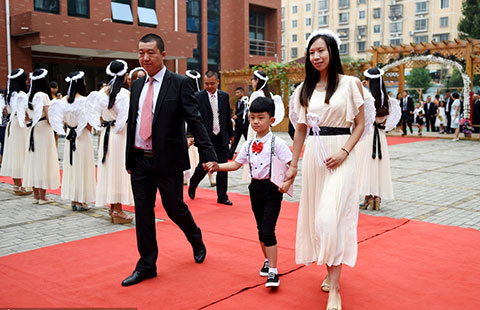
 Red carpet ceremony for first grade kids
Red carpet ceremony for first grade kids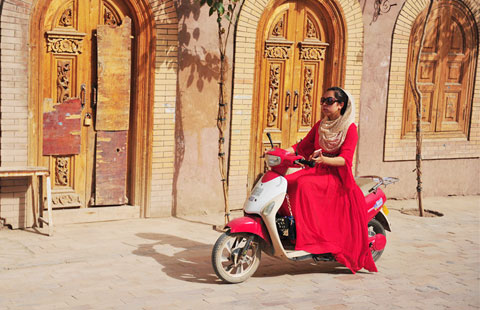
 Kashgar old city in Xinjiang is well preserved
Kashgar old city in Xinjiang is well preserved
 Infographic: Symbols behind numbers
Infographic: Symbols behind numbers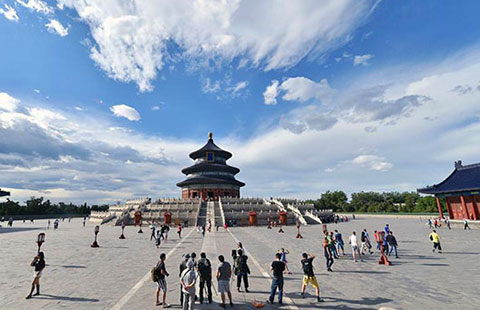
 Beijing's preparations begin long before the parade starts
Beijing's preparations begin long before the parade starts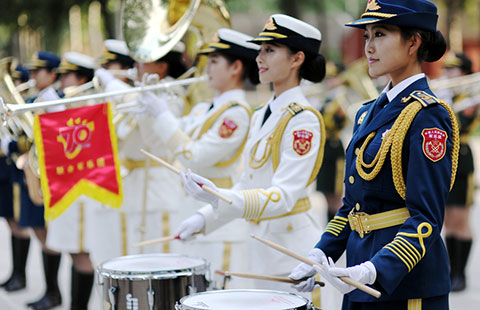
 Female soldiers of military band practice for the V-Day parade
Female soldiers of military band practice for the V-Day parade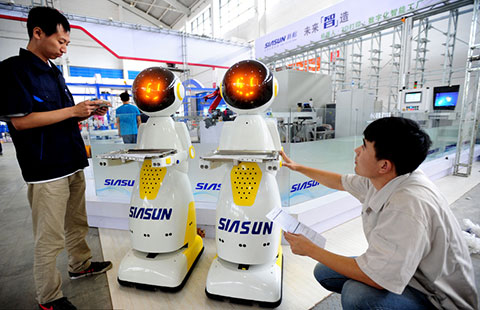
 Robotic exhibition set to kick off in Shenyang
Robotic exhibition set to kick off in Shenyang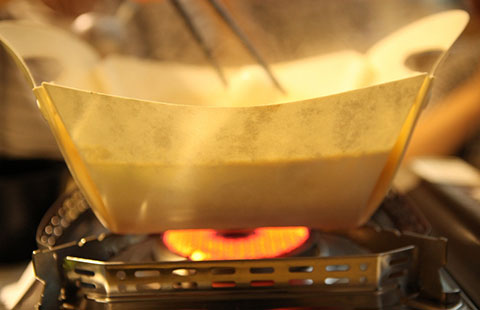
 Eat from a paper hotpot
Eat from a paper hotpot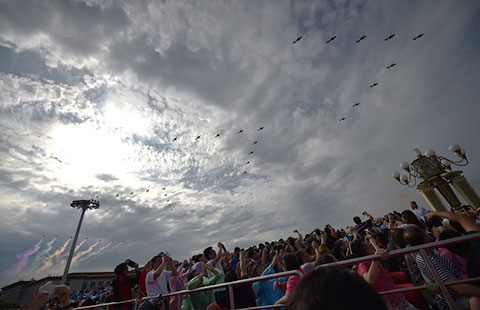
 8 interesting facts about the upcoming V-day Parade
8 interesting facts about the upcoming V-day Parade
Most Viewed
Editor's Picks

|

|

|

|

|

|
Today's Top News
Xi awards medals to veterans
China and US working closely on every major issue: Envoy
$16b added by 50 brokerages to support shaky market
PLA to showcase top weapons for the first time in parade
Senior US official to visit China on bilateral issues
China manufacturing PMI falls to 49.7 in August
Second homes in China need lower down payment
Xi meets with former KMT chairman
US Weekly

|

|
